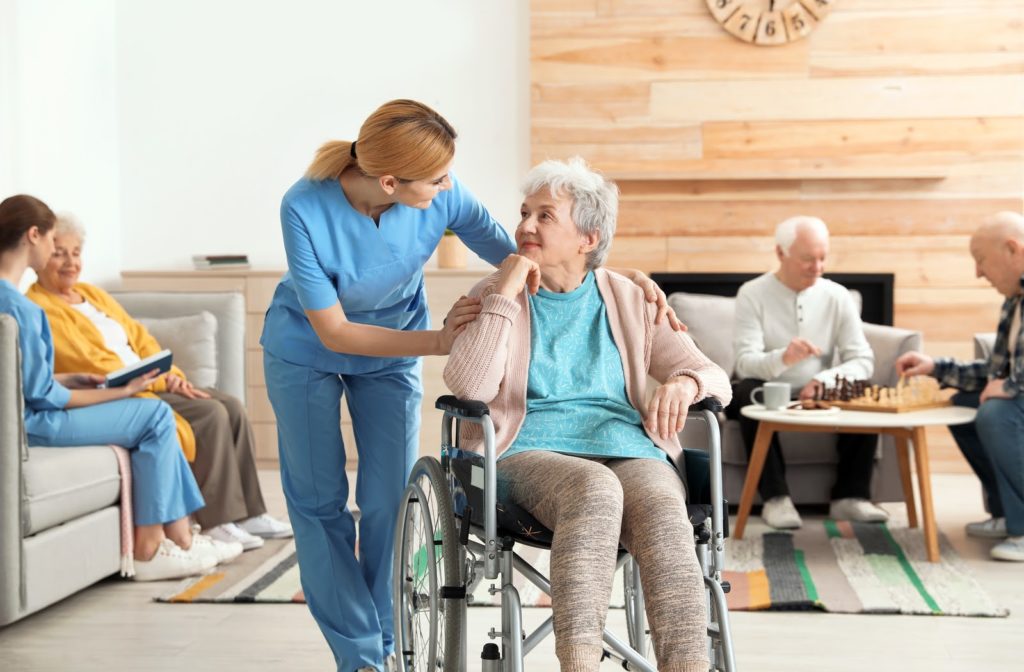Get specialized attention with professional Memory Care services.
Get specialized attention with professional Memory Care services.
Blog Article
The Role of Assisted Residing In Giving Specialized Look After Dementia Patients
The arrangement of specialized take care of mental deterioration patients within nursing home is progressively identified as a vital component of efficient mental deterioration monitoring. These environments are designed to deal with the special cognitive and psychological obstacles dealt with by individuals with mental deterioration, using tailored assistance that promotes security and wellness. By incorporating structured routines and engaging tasks, aided living can mitigate sensations of seclusion while enhancing overall top quality of life. Nonetheless, the effectiveness of these programs often rests on various elements, consisting of staff training and family involvement, prompting a closer evaluation of just how these elements connect to maximize treatment results.
Recognizing Dementia Care Needs
Recognizing the treatment demands of individuals with mental deterioration is crucial for giving efficient assistance and improving their top quality of life. Dementia is a dynamic neurological condition that impacts cognitive features such as memory, reasoning, and interaction. Consequently, people with mental deterioration typically call for support with daily tasks, personalized care strategies, and emotional assistance.
Reliable dementia care entails recognizing the special challenges dealt with by each person. This includes recognizing the stages of dementia, which can range from moderate cognitive problems to advanced stages requiring thorough assistance. Care needs may include assistance in taking care of day-to-day regimens, drug adherence, and maintaining social interactions to avoid isolation.
Furthermore, sensory excitement and acquainted environments can substantially boost the well-being of individuals with dementia. Caregivers must be educated to recognize behavior adjustments and use approaches customized per individual's choices and previous experiences. Methods such as recognition treatment and memory can aid connect properly and promote a complacency.
Inevitably, efficiently attending to the treatment requirements of individuals with dementia requires a thoughtful strategy, recurring training for caregivers, and a commitment to maintaining self-respect and regard throughout the caregiving process.
Benefits of Assisted Living

An additional significant benefit is the safe and secure atmosphere these centers provide. Citizens gain from features such as protected entries and kept track of common locations, decreasing the danger of straying and enhancing overall security. Furthermore, assisted living promotes social interaction amongst homeowners, fostering a feeling of community and belonging. Involving with peers can relieve feelings of seclusion, which are typical in those coping with mental deterioration.
Additionally, several assisted living facilities offer support with everyday activities, such as medication monitoring, showering, and dish prep work. This assistance enables citizens to preserve their self-reliance while guaranteeing their wellness and health are focused on. Inevitably, assisted living functions as a useful source, balancing care and freedom for people with dementia and their families.

Specialized Programs and Tasks
(Charlotte Alzheimer's Care)Recognizing the distinct requirements of individuals with mental deterioration, lots of assisted living centers apply specialized programs and tasks made to boost cognitive feature and promote overall well-being. These programs often consist of cognitive stimulation activities that involve citizens in memory games, puzzles, and memory treatment, which motivates the sharing of personal tales and previous experiences.
In addition, art and songs therapy play substantial functions in fostering imagination and emotional expression (Memory Care). Engaging locals in paint, crafting, or music sessions can give restorative benefits, assisting to reduce stress and anxiety and improve mood. Physical activities, such as mild exercises and dancing sessions, are also vital, as they promote wheelchair and physical health while motivating social interaction among residents
Structured day-to-day routines are typically developed to offer a feeling of stability and predictability for individuals with dementia. These regimens can consist of scheduled meal times, group activities, go to my blog and individualized treatment plans that accommodate specific interests and capabilities. By developing an enriching environment filled up with customized tasks, assisted living facilities not just improve the lifestyle for dementia individuals yet also foster a sense of community and belonging.
Educated Team and Assistance
(Dementia Care Charlotte)In aided living facilities, the visibility of qualified team is important for supplying effective support to people with dementia. These specialists have specialized knowledge and skills to resolve the distinct requirements of residents, ensuring their safety and security, convenience, and well-being. Personnel receive training in mental deterioration treatment, that includes understanding the progression of the condition, recognizing behavioral modifications, and using effective communication methods.
In addition, trained personnel are equipped to execute individualized treatment strategies tailored to each local's choices and capacities. This personalized approach promotes a feeling of freedom and self-respect, permitting residents to participate in meaningful activities that improve their high quality of life. The team additionally play a vital role in checking wellness and health, promptly identifying any changes in condition that may require medical attention.
In addition to direct treatment, experienced staff provide psychological support to citizens, aiding to reduce feelings of complication and anxiousness that often accompany mental deterioration. Their thoughtful strategy develops a caring setting where residents really feel valued and recognized - Memory Care. Eventually, the know-how and commitment of qualified staff are important in delivering detailed treatment that satisfies the complex demands of people dealing with dementia in assisted living setups
Household Participation and Resources
Family involvement plays a significant duty in the care of people with dementia in assisted living facilities. Involving family participants in the care procedure not just improves the emotional health of the local yet likewise fosters a collective environment where treatment plans can be tailored to individual requirements. Families can give important understandings into the choices, history, and habits of their enjoyed ones, which can educate caregivers and bring about more tailored care techniques.
Moreover, helped living centers typically supply sources for family members, such as support system and instructional workshops. These resources can assist family members understand dementia, boost communication techniques, and establish coping mechanisms. Involvement in these programs can encourage relative, furnishing them with the devices necessary to support their liked ones properly.
In addition, normal interaction in between families and staff is critical. This ongoing dialogue enables households to remain informed regarding their liked one's progression and any kind of changes in care plans. Ultimately, a strong partnership between families and helped living facilities promotes an atmosphere of depend on and understanding, making certain that people with mental deterioration obtain the specialized treatment they deserve while preserving their household connections.
Final Thought
In final thought, aided living facilities play a vital role in addressing the special requirements of dementia individuals via personalized care and assistance. Inevitably, assisted living offers vital resources that substantially enhance the high quality of life for those living with mental deterioration.
Report this page